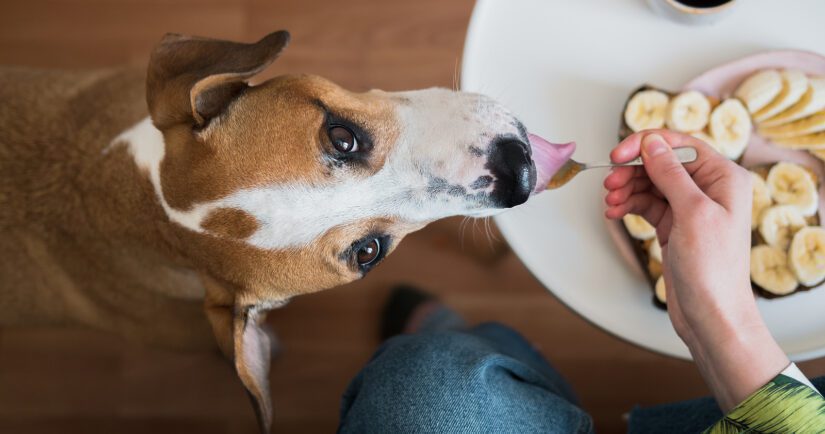Dogs and peanut butter are almost as synonymous as peanut butter and jelly. It’s as if your dog has a sixth sense about the nutty spread. No sooner do you open the jar and your furry friend is there, waiting for a lick. A number of pet guardians give their dog a snack of peanut butter whether it’s spread inside hollow bones and toys for a fun treat or a spoonful for a reward. But is peanut butter good for your dog? That depends on your dog, the spread, and the amount.

Is peanut butter safe for your dogs to eat?
Most healthy dogs can have some nut butters including cashews and peanuts. However, higher fat nuts like almonds, walnuts, and pecans, can cause digestive issues due to their size and the higher amount of oils and fats contained with them. The healthiest option for your dog is unsalted or homemade peanut butter as it can contains less sugar and salt and no other additives that could potentially make them sick.
If you’re sticking to a store-bought brand, be sure to read the labels first before giving any to your dog. Definitely keep peanut butter that contains chocolate or xylitol far away from your pooch. Xylitol is a sugar substitute found in candies, toothpaste, and other human foods as a sweetener, and while it’s safe for people to eat, it’s toxic for dogs. Consumption of xylitol causes a sudden, dangerous drop in blood sugar, which can be life-threatening when left untreated.
Symptoms of xylitol ingestion includes:
- Confusion
- Stumbling
- Lethargy (excessive sleepiness and depression)
- Seizures
Also keep your dog away from any peanut butter that contains chocolate, which is also toxic, and can be potentially lethal too.
Symptoms of chocolate ingestion include:
- Vomiting
- Diarrhea
- Increased thirst
- Panting or restlessness
- Excessive urination
- Racing heart rate
If you notice any of the above symptoms or suspect your dog has ingested xylitol or chocolate, contact your veterinarian or an emergency veterinary clinic immediately. How quickly treatment is started can mean the difference between life and death.

How much peanut butter can a dog eat?
As an energy-dense food, peanut butter is high in calories and fat, which is why when it comes to your dog’s health, less is more. Too much of it could lead to obesity and other health complications, like pancreatitis.
Since every dog’s nutritional needs are different, consult with your veterinarian about how many calories your dog should be eating daily, including both meals and treats. As a guideline, only 10% of your four-legged friend’s caloric intake should come from treats, like peanut butter.
Can your dog be allergic to peanut butter?
Just like people, some dogs might be allergic to peanut butter.
Symptoms of an allergic reaction can include:
- Red and itchy skin
- Bald patches
- Hotspots
- Difficulty breathing
- Agitation
- Diarrhea
- Vomiting
If you notice your dog experiencing any of the symptoms above, contact your veterinarian or an emergency veterinary clinic immediately.
What about seed butters?
Seed butters are a great alternative to nut butters, but not all seed butters are healthy for your furry friend. Dogs can enjoy the following seed butters:
- Chia seed
- Pumpkin seed
- Sunflower seed (make sure the outer shell is first removed)
- Hemp
- Quinoa
- Sesame
Treating your pup to some peanut butter brings joy to both pet and pet guardian. By following the advice above, you’ll both enjoy many licks to come.
More articles like this
What fruits can my dog eat?
Doggy diet dangers: What to avoid feeding Fido
Avoid a catastrophe: Foods that spell trouble for your cat
